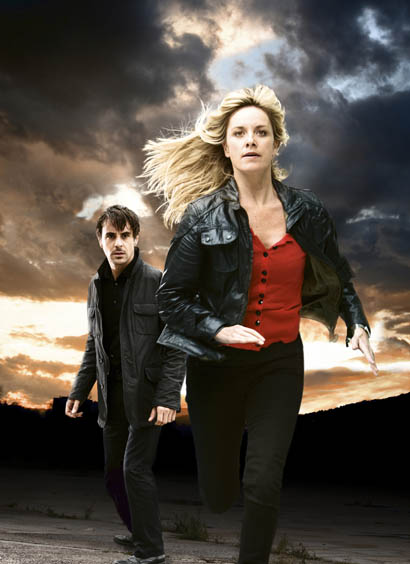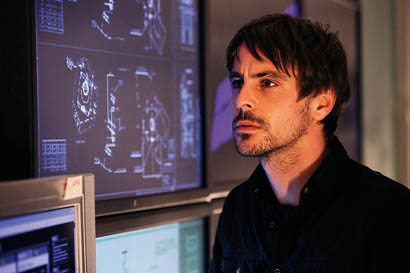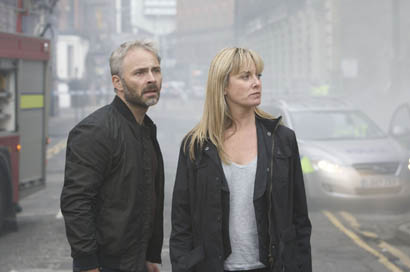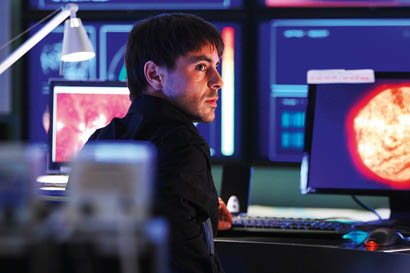
This isn’t the sort of place you’d expect to find a team of detectives. This state-of-the-art facility is clearly more used to scientific investigations than criminal ones, but nevertheless the lab is filled with the telltale signs of a police presence. Nestled among the giant viewscreens, complex computer equipment and star charts that suggest top astronomical research is taking place (in fact, it’s an observatory monitoring the sun’s weather) are whiteboards plastered with photographic evidence and scribblings. What’s the meaning of that personalised number plate? Who the hell is Daniel Simpson Thornwell? And what did cops do before the invention of the Post-it note?
If this seems like an unusual setting for a base of operations, that’s because Paradox isn’t your ordinary police procedural show. DI Rebecca Flint (former EastEnder Tamzin Outhwaite) and her team are getting help from a rather unlikely source, in the form of messages that appear to come from the future. A set of abstract images has been downloaded from the Prometheus 2 satellite by astronomer Dr Christian King (Emun Elliott) and he’s called in the police because they appear to contain clues to events that are yet to happen. And whether or not such evidence is admissible in court, it’s got to be worth a look, right?
“What our characters try to do is connect the images, and work out what it is that we’re trying to prevent,” explains Outhwaite, taking a break from shooting on the show’s Manchester set. “The first time it’s about 74 people who have died, the second time it’s one child, and it’s about the repercussions of us getting there or not getting there in time.”
“Every week there’s a kind of countdown to zero hour, so it’s very much a ticking clock,” adds producer Marcus Wilson. “From the moment the images come down to the moment they’re supposed to be realised is 18 hours. But they don’t always get them 18 hours ahead – in fact, in one episode they only get them four hours before.”
In the police drama genre, where innovation rarely stretches beyond taking your detectives to a previously unvisited region of the UK (see Alan Partridge’s proposed Swallow), seeing the answers before the questions turns the game on its head somewhat. In fact, it suddenly becomes less of a whodunit than a “what the hell happened?”
“We were interested in doing something about the police, but also doing something really different,” says Clerkenwell Films’ executive producer Murray Ferguson. “It’s a very familiar genre, and we wanted to try to find a very fresh way at it. “
“Clerkenwell said to me, ‘I wonder what would happen if you could see a crime in the future,’ and it really stuck in my mind,” explains creator and writer Lizzie Mickery. “As it goes along you get into all the moral and emotional dilemmas about how much you’re interfering with the future, how much you’re creating the future and whether you should be doing it anyway. So once the characters have got through the ‘Oh my god, this has happened’ phase, there’s the thing about if we know it’s going to happen, should we do anything about it? Even in the first episode they’re almost working off-piste. The police are sent in to deal with something completely opposite to the way they’re used to doing it. Normally they have a dead body and they go out and find the person who killed the other person, but this is the police on the other side. Subsequently they can’t tell anyone what they’re doing – when they’re trying to get information from people, they can’t actually say, ‘Well, we think something’s going to happen in the future…’ because they’d feel stupid.”
Get sneak previews, exclusive competitions and details of special events each month!
Ah yes, that age-old SF dilemma about meddling with the space-time continuum and the concept of fate. Of course, everyone involved in the investigations has a slightly different take on what’s going on and how to deal with it. Some are sceptical and dismiss following the clues in the messages as a pointless wild goose chase. Others, meanwhile, find their faith being challenged by what’s coming down
from the sky.

“DI Flint is driven, ambitious and particularly good at her job,” explains Outhwaite. “She’s very, very open and she believes that everything that’s going on is definitely possible. She finds the whole thing really exciting when the others are very sceptical, and rightly so – I think most of the British population would be sceptical for at least a moment about it. But she goes with it, and I think she really relishes and enjoys the way it’s possible for her to almost play God, and it becomes about her judgement, and whether or not she can change circumstances.”
Joining DI Flint in the investigations are her ex, DS Ben Holt (Mark Bonnar), rookie DC Callum Gada (Chiké Okonkwo) and King, the scientist who showed them the pictures in the first place. With an IQ off the chart, the intense, domineering King seems more interested in the scientific implications of his discovery than actually saving any lives. His motives could also be described as ambiguous.
“He’s not somebody who’s inhibited by social pressures,” says Mickery. “Consequently he’ll only advise or help if he feels it’s worth it. And he doesn’t suffer fools.“
“He’s the mystery element and he has a very different approach to the police, a different outlook on life and evidence and meaning and time,” Ferguson adds. “What he’s about and how much they can believe what he’s saying is all part of the unknown.”
While that mystery initially seems outlandish, the production team did try to give the messages from the future some grounding in reality. Indeed, research for the show stretched well beyond hanging out with real-life detectives (“Tamzin spent some time with the police in Manchester, but we didn’t actually say to them, ‘What would you do with some evidence from the future?’!” laughs Ferguson) to take in some cutting edge physics.
“We’re grounding it in a reality that everyone else can recognise, but with some strange goings-on,” says Ferguson. “The questions Rebecca asks at the end of episode one are those the audience will be asking. And the more she finds out through the first series, the more the audience will be taken with her.”
“I tried to keep it as near theoretically possible as possible, which of course meant that I had to do a bit of investigation into the science of it,” chips in Mickery. “Once I’d written the first two episodes, I thought we ought to speak to a physicist, so we got [space scientist] Dr Maggie Aderin in. Luckily my basic physics had been correct, but Maggie started expanding some ideas. I’d started off in a good place, but this is a woman who builds satellites, you know [laughs] – she comes up with fantastic things a mere layperson would never know!

“That makes it a complicated show to write for,” she continues, “because you have the investigative bit, you have the science bit, you have the emotional bit and then of course you have a Ministry of Defence bit running underneath, because if this is all true it’s the most extraordinary thing that’s ever happened. And what are they going to do about it?”
If all goes to plan, then the questions will continue beyond the show’s initial five-episode run. “By the end of the first series Christian thinks he has an idea of where the images may be coming from,” explains Wilson, “but hopefully a series two and three will reveal who’s sent them.”
“We know what the end point is,” says Mickery. “We thought that was important otherwise you can drift away and let your audience down later on.”
But before that? “As Christian says later on in the series, ‘There are no answers, only more questions.’”

SFX Magazine is the world's number one sci-fi, fantasy, and horror magazine published by Future PLC. Established in 1995, SFX Magazine prides itself on writing for its fans, welcoming geeks, collectors, and aficionados into its readership for over 25 years. Covering films, TV shows, books, comics, games, merch, and more, SFX Magazine is published every month. If you love it, chances are we do too and you'll find it in SFX.


